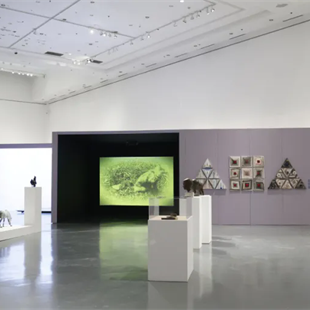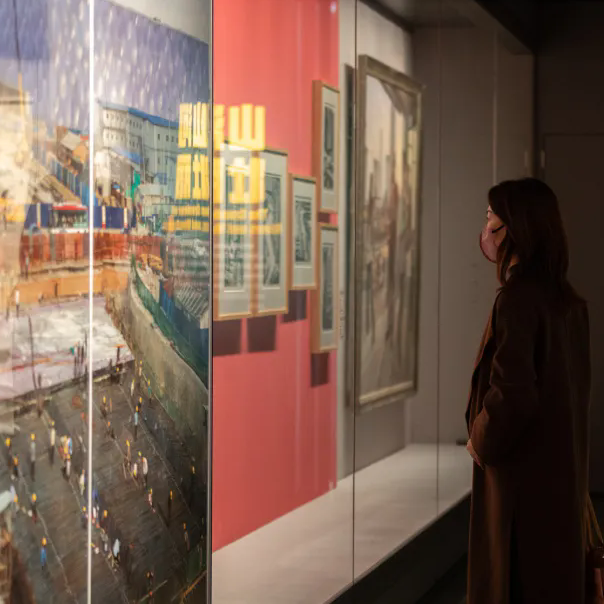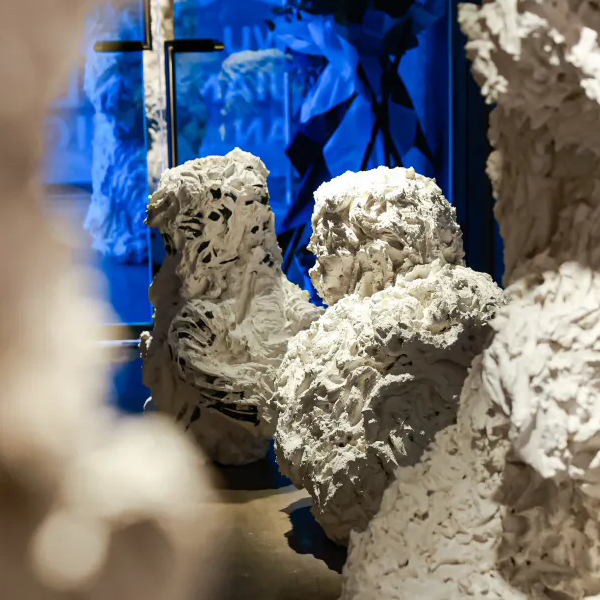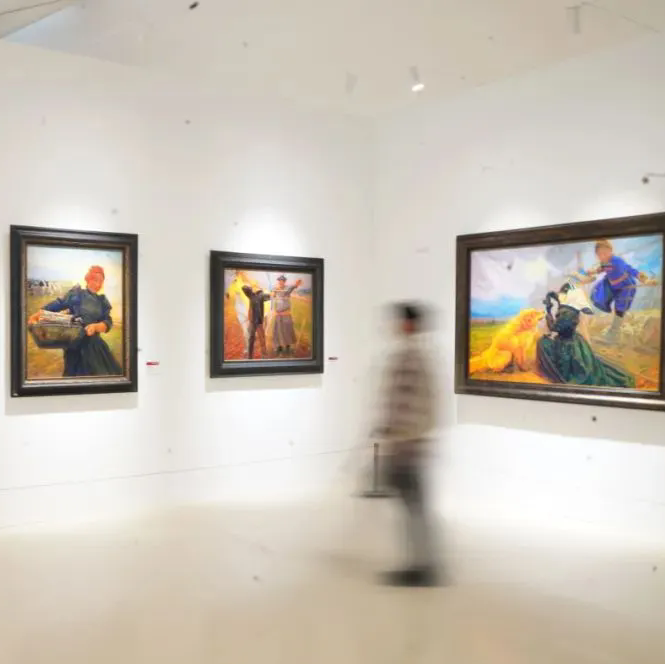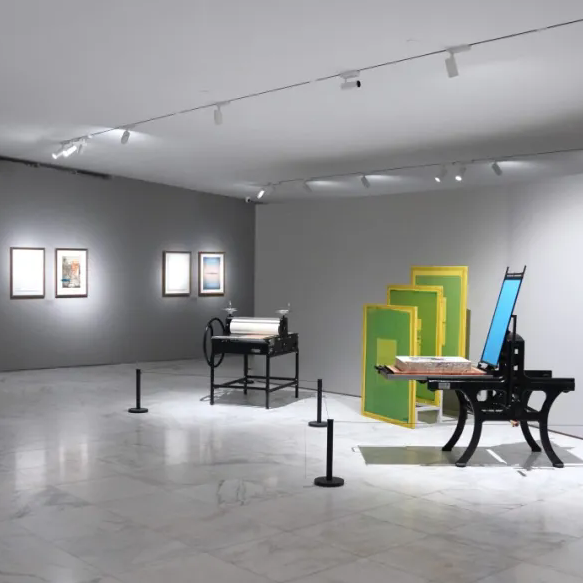
Trinh T. Minh-ha, What About China? (still), 2022. Single-channel video, color, sound, 135 minutes. Courtesy of the artist and commissioned by Rockbund Art Museum.
After a three-year close collaboration with Trinh T. Minh-ha, Rockbund Art Museum (RAM) presents Traveling in the Dark, an art project that brings together an exhibition, a series of events, and a publication. Offering a unique experience of RAM architecture by a subtle distribution of the daylight with colored filters dispatched on the windows, as well as flowing water projections at the entrance of some galleries, creating interesting dialogues between the white cubes of the Museum and the different black cubes built up for movie screenings, the exhibition features a selection of Trinh T. Minh-ha’s major films, a reading room gathering the publications of the artist, a dedicated space for collective learning and unique screening events like the newly produced movie "What About China?". The fifth floor gallery also invite the visitor to walk around different aphorisms written by Trinh T. Minh-ha and printed on semi-transparent films suspended from the ceiling.


Installation view of Trinh T. Minh-ha: Traveling in the Dark, Rockbund Art Museum, Shanghai, 2022.
Born in Vietnam, Trinh T. Minh-ha is a film director, poet, writer, music composer, literary and art theorist, and distinguished professor in the departments of Gender & Women’s Studies and of Rhetoric at the University of California, Berkeley.
As a visual, sonic, poetic, and philosophical experience, Traveling in the Dark intends to invite audiences to rethink reality differently from an approach based on “knowledge.” The play of visibility and invisibility—or what is seen, not seen and unseen—runs through the whole of Trinh T. Minh-ha’s work. In an open montage made up of resonances, vibrations, recollections, exchanges, brushes, reflections, and passages, this project undermines any pretense of a fixed identity, a historical truth, or a prescribed territory, and reflects on and questions the spaces opened up by the dark. Traveling in the Dark is also part of a major collaborative research project spanning 2019 to 2022 between RAM and a number of prestigious art institutions including NTU Center for Contemporary Art (Singapore), Wattis Institute (San Francisco), and Württembergischer Kunstverein (Stuttgart).


Installation view of Trinh T. Minh-ha: Traveling in the Dark, Rockbund Art Museum, Shanghai, 2022.As Larys Frogier, curator of the project, puts it: Traveling in the Dark grants a particular importance to temporality, that is to say to this experience of a necessary time that one allows to oneself and with the other to stretch an image, to experience a question, to think a sensation, to make oneself available to desire in so far as it is made of so many moments of frustration, expectation, irritation, generosity and complicity. In this sense, Traveling in the Dark cannot be satisfied with a simple exhibition visit that would be based on the spectacular monstration of seductive images ready to be quickly consumed one after the other. This journey into undefined obscurities and temporalities requires from us a commitment in our own availability to dig in our buried memories, to (re)find (un)expected images or sounds, to raise questions that will never be followed by affirmative and definitive answers.
Throughout the project, RAM will organize a series of workshops, lectures, and dialogues in order to provide audiences with a more multi-faceted experience of Trinh T. Minh-ha’s world. In addition, a publication will be available to the public in 2023. Rather than an exhibition catalogue or an academic text, the publication Traveling in the Dark will be a fully-fledged artistic project expanded with writings, poems, and aphorisms by the artist alongside various interviews.
Selected Film Introduction

Trinh T. Minh-ha, Night Passage, 2004. Single-channel video, color, sound, 98 minutues. Courtesy of the artist. Installation view of Trinh T. Minh-ha: Traveling in the Dark, Rockbund Art Museum, Shanghai, 2022.
Night Passage (2004)
Night Passage (2004) is a digital film on friendship and death. Made in homage to Miyazawa Kenji’s classic novel Night Train to the Stars, the story revolves around the spiritual journey of a young woman, in the company of her best friend and a little boy, into a world of rich in-between realities. Their journey into the land of “awakened dream” and out is experienced as a passage of appearances, from a death to a return in life that occurs during a long ride on a night train.
At each stop of the train, the travelers set out in the dark and come across an inner space of longing, in which their ears and eyes meet with people and events at once too familiar and oddly strange. Every encounter opens a door into the transcultural, and every intervention offers an experience of non-illusory, two-dimensional time-space spectacles: the colorful floors give off strange sounds, people at the dinner party dines eerily, two dancers with mask and white veil dance in the wind, water, and light...The film itself unfolds in the sequential rhythm of a train of window images. With magnetic intensity, each place features a gesture of the sensual world or a means of reception and communication of our times. It is worth mentioning that Night Passage is displayed in a "black box" that imitates a train carriage, so that the audience seems to be involved in the journey of the night passage.
Screening Schedule:
Tuesday – Friday: 14:30 16:20 18:10 19:50
Saturday & Sunday: 10:30 12:40 14:30 16:20

Trinh T. Minh-ha, The Fourth Dimension, 2001. Single-channel video, color, sound, 87 minutes. Courtesy of the artist.
Installation view of Trinh T. Minh-ha: Traveling in the Dark, Rockbund Art Museum, Shanghai, 2022.
The Fourth Dimension (2001)
The Fourth Dimension (2001) is Trinh T. Minh-ha’s first digital film, an incisive and insightful examination of Japan through its art, culture, and social rituals in the form of a journey. The fourth dimension, usually referring to time, is presented in the film as a multi-layered time and space – the mesmerizing chemistry between time, journey and rituals. Today, when one goes on a journey, the travel is ritualized through the visual machine. In the process, it is the encounter between human and machine, viewer and image, fact and fancy that determines the field of relations in which new interactions between past and present are made possible. With its lush imagery, Minh-ha’s Japan is viewed through mobile frames, with doors and windows sliding shut, revealing new vistas as it blocks out the old light. In film-making, orange and blue are often used to create contrast, so the windows in the museum are pasted with window films of these two colors, presenting a set of complementary colors commonly-seen in Trinh T. Minh-ha's films. In this way, the spaces of the exhibition become the extension of the fourth dimension in the film, and the changing light lead the audience to feel the flowing and flashback of time.
Screening Schedule:
Tuesday – Friday: 13:15 14:50 16:30 18:05 19:35
Saturday & Sunday: 10:00 11:40 13:15 14:50 16:30

Trinh T. Minh-ha, Naked Spaces: Living is Round, Singl-channel video, color, sound, 135 minutes.
Courtesy of the artist. Installation view of Trinh T. Minh-ha: Traveling in the Dark, Rockbund Art Museum, Shanghai, 2022.
Naked Spaces: Living is Round (1985)
Naked Spaces – Living is Round (1985) is a film on the poetics of dwelling and on the relation between houses and cosmos in West Africa. Shot with stunning elegance and clarity, the film explores the rhythm and ritual of life in the rural environments of six West African countries (Mauritania, Mali, Burkina Faso, Togo, Benin and Senegal) and surveys the integration of ritual and work, home and the world. The film exemplifies the way the filmmaker approaches the subjects portrayed in her films—a position she has described as 'speaking nearby' rather than 'speaking about'. It allows open space for both sides to go in and out freely. By putting aside the question of authority and production of meaning, it opens up more possibilities and resolves the binary opposition between actively seeing and passively being seen, in other words, between the subject and the object, achieving a state of harmonious interaction.
The nonlinear structure of Naked Spaces challenges the traditions of ethnographic filmmaking, while sensuous sights and sounds lead the viewer on a poetic journey to the most inaccessible parts of the African continent.
Screening Schedule:
Tuesday – Friday: 13:00 15:40 18:15
Saturday & Sunday: 10:15 13:00 15:40
About the Artist
Born in Vietnam, Trinh T. Minh-ha is a filmmaker, writer and music composer. She is Distinguished Professor of the Graduate School in the departments of Gender & Women’s Studies and of Rhetoric at the University of California, Berkeley. Spanning nearly four decades, Minh-ha’s complex, theoretical, and poetic practice includes moving image, writing, musical composition, installation, and teaching.
Recognized for her innovative and experimental approaches to image-making and storytelling, Minh-ha’s work has significantly influenced numerous artists, directors, and thinkers across several generations. She dedicates her practice to questioning systems of knowledge, representation, and experience related to cultural identity and memory, and has made profound contributions to the fields of postcolonial and feminist studies.
The work inhabits spaces between documentary fiction, performance, poetry, and experimental film, enhanced by the use of reflexive cinematic techniques and editorial processes that look to open up the medium of moving-image to frame new ways of looking and experiencing culture.
Retrospectives and surveys of her films have been presented at the Institute of Contemporary Art, London; Secession, Vienna; Jeu de Paume, Paris; and the Museo Nacional Centro de Arte Reina Sofia, Madrid, among many, many others. In 2018, M+ Museum of Visual Culture, West Kowloon Cultural Council, Hong Kong, in collaboration with ICA London and Hong Kong Arts Centre, presented a retrospective of Trinh T. Minh-ha during Art Basel Hong Kong. She has participated in the 2012 Contemporary Art Triennale at the Palais de Tokyo; the 1987 and 1992 Whitney Biennials; Documenta 11; and the Shanghai (2004), Busan (2004), and Kyoto (2003) Art Biennales.
Minh-ha is the recipient of numerous awards, including the Wild Dreamer Lifetime Achievement Award at the Subversive Festival, Zagreb, Croatia, 2014; the Lifetime Achievement Award from Women's Caucus for Art, 2012; and the 2006 Trailblazers Award at the MIPDoc (International Documentary Film Event) in Cannes, France. She received an Honorary Doctor of Fine Arts from California College of the Arts in 2007 and Oberlin College in 1990. She was invited to be part of The Academy of Motion Picture Arts and Sciences’ Class of 2016.
About the exhibition
Dates: Nov 12, 2022 - Feb 5, 2023
Venue: Rockbund Art Museum (20 Huqiu Road, Huangpu District, Shanghai)
Curator: Larys Frogier
Artist: Trinh T. Minh-ha
Courtesy of the Artist and Rockbund Art Museum.


